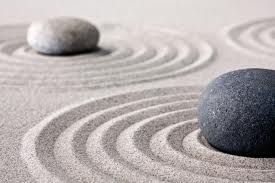The Buddhist doctrine of no self is often misunderstood even by some Buddhists. People with low self esteem are known to embrace it: See, it is a good thing to have no self!
But of course the doctrine does not mean that the self does not exist. It means that the self that does exist is a transient something that never stays the same even for two consecutive moments. Therefore, there is nothing stable enough to point at and say: There it is! We cannot nail Jell-O to a tree and we cannot identify a self. It’s a moving target that can never be hit.
The Buddhist doctrine of no self also means that no independent self can stand apart from the rest of the world. We live in the net constructed by the Hindu goddess Indra where every part of the net is reflected in every other part. We can’t live without plants and plants can’t live without earthworms and earthworms can’t live without soil which is made by plants that have decayed and so on forever.
Nothing stands apart from everything else and that’s how we know that the Christians err when they create a god who stands outside of existence in judgment on it. Nothing lives outside of Indra’s net and the Christian god is a part of everything else just like we are.
The Christian mystic Meister Eckhart, who was god-obsessed, said this of no self:
“Start with yourself therefore and take leave of yourself…Truly, if someone were to renounce a kingdom or the whole world while still holding onto themselves, then they would have renounced nothing at all…”If anyone would follow me, he must first deny himself” (Matt. 16:24). This is the point which counts. Examine yourself, and whenever you find yourself, then take leave of yourself. This is the best way of all.”
Davies, Oliver, Meister Eckhart, Selected Writings, pps. 6-7, Penguin Classics (Boston 1994).
So we conclude that Meister Eckhart’s understanding of no-self is not the Buddhist understanding. Meister Eckhart merely wanted each individual to deny the self in order to accept the selfhood of Jesus. This misses the mark completely, merely re-establishing the abandoned self for the self of another.
We Buddhists don’t abandon our self. We just understand that it is not a static thing and it changes every moment just like the universe does because it is a part of the ever-changing universe which also lacks a self.
And we also understand that what Meister Eckhart called God or Jesus is nothing other than our inherent Buddha nature. It makes no sense at all for us to worship ourselves.
